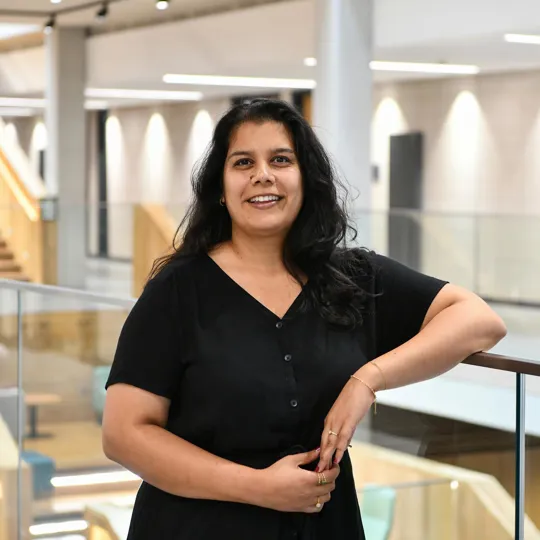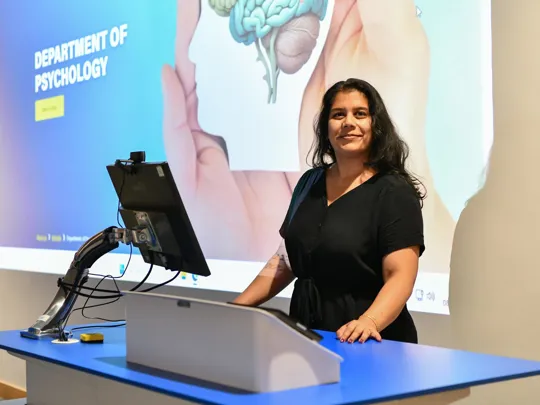- About us
- Staff directory
- Dr Daniella Nayyar

Dr Daniella Nayyar
Department of Health and Nutrition
Senior Lecturer
Academic qualifications
BSc Human Psychology, PhD in Applied Social and Political Psychology
"My teaching covers positive psychology, social and community psychology, psychology in diverse communities, and applied psychology and my research explores social inclusion, the BAME gap, and the impact of identity on behaviour."

I’m a Senior Lecturer and a Higher Education Academy Fellow with a passion for social psychology, identity and group processes, community work, and applied research that makes a real impact. My teaching covers positive psychology, social and community psychology, psychology in diverse communities, and applied psychology across our MSc and BSc courses and foundation years.
With around ten years’ experience teaching in higher education (progressing from teaching assistant to senior lecturer while completing my PhD), I’ve worked in a range of roles and educational institutions across Birmingham (where I’m from), and I’ve had lots of charity and outreach experience locally. While I understand the local landscape, I’m always open to making new discoveries and connections, and I’m delighted to pass on this knowledge to students.

My research explores social inclusion, the BAME gap, and the impact of identity on behaviour, and I have had my work published in the ‘Annual Review of Critical Psychology, Leadership, and Social Inclusion’ and several other publications, magazines and journals. I also contribute to public discussion around the evolution of higher education and what it means to be a psychologist. I’m proud to serve on the advisory board for Voices of Colour, a non-profit amplifying underrepresented voices.
What inspires me most is learning from the different perspectives my students bring. They all bring unique experiences and backgrounds, and I enjoy learning from their insights through our lively discussions. Students appreciate how interactive my sessions are and say I’m able to explain complex concepts in ways that make sense - sometimes with the help of Lego! My advice to new students is to think carefully about your goals and what motivates you before starting your studies.
One myth that I’d like to dispel about our industry is that psychology is all about “reading minds” or studying serial killers. In reality, psychology is relevant anywhere we interact with or want to understand people.
Outside of work, I love reading fantasy, walking, swimming, knitting, puzzles, and music (especially live gigs), as well as socialising with family and friends. My favourite animal is the elephant, and my favourite quote is: “Keep moving forward!”.
Research
Nayyar, D. (2024). Exploring intergroup perceptions of voters in the European Union Referendum and United States Presidential Election, held in 2016. Annual Review of Critical Psychology, 17, 108-123.
Christian, J., Nayyar, D.(co-first), Riggio, R., & Abrams, D. (2018). Them and us: Did Democrat inclusiveness and Republican solidarity lead to the 2016 US presidential election outcome?. Leadership, DOI: 1742715018793733.
Christian, J., Clapham, D., Abrams, D., Thomas, S., Nayyar, D., & Colter, J. (2016). Designing Effective Services: The Impact of Identities on the Move from Homelessness to Social Inclusion. Social Inclusion – Special Issue on Homelessness.
Conference Paper: Christian, J., Clapham, D., Cotler, J., & Nayyar, D. (2015). Designing Effective Services for Homeless People: Are Self-Efficacy Based Interventions a Solution for Enhancing Well-Being? Paper Presented at Housing Studies Association, Housing and Well- Being Day Seminar, University of Reading, White Knights Business School, 14th Jan, 2015.
Nayyar, D. (2020). A New Hope: Covid-19 and the evolution of higher education. Arden University School of Psychology magazine.
Nayyar, D. (2020). What it means to be brown. Juice Magazine.
Nayyar, D. (2020). Understanding the BAME gap (Letter). The Psychologist, BPS, 33, pg 13.
Nayyar, D. (2020). What Makes a Psychologist? The Psychologist. BPS, 33, pg 26 – 37.